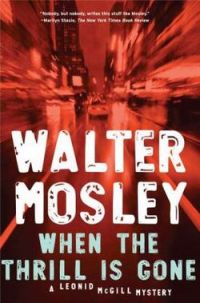
Published by Riverhead on March 8, 2011
A woman who claims to be Cyril Tyler's wife tells private detective Leonid McGill that her wealthy husband is responsible for the deaths of his first two wives. She wants McGill to save her from becoming his next victim. In need of money, McGill accepts the case but soon suspects that the woman is not in fact Chrystal Tyler. His attempt to resolve the mystery brings him into contact with the rich and poor, cops and thugs, captive children and corpses. Along the way his own children and other members of his unconventional family add to his angst.
Walter Mosley populates his sentences with observations as bright and multifaceted as gemstones. He's as much a philosopher as a mystery writer. Mosley describes a deceased character in When the Thrill Is Gone as "a complex thinker who worried about a pedestrian world." He might have been describing himself. Mosley understands human nature in all its wonderful variation. He writes eloquently but succinctly about love and betrayal, race and poverty, hard life and bitter death. Mosley gives depth to his characters while honing his story to its essentials, never miring the plot in wasted words. His dialog is snappy; his descriptions are vivid. Although the story moves with blazing speed, I found myself reading sentences and paragraphs two or three times, slowing the pace of my reading to savor Mosley's prose.
Mosley sprinkles effective doses of humor into the narrative. The story feels authentic, as do the characters: quirky enough to be interesting but grounded in life's daily pleasures and misfortunes. The mystery itself, including its resolution, is rather ordinary; the plot is engaging but unspectacular. The tale Mosley tells in When the Thrill Is Gone almost seems secondary to the writing itself. Its value is as a vehicle to drive the story of McGill's life, a fascinating life we glimpse over the course of a few days. The mystery of McGill is more interesting than the mystery he solves.
This is Mosley's third novel featuring Leonid McGill but the first I've read. The narrative makes repeated references to past events in McGill's life, some of which I assume were chronicled in the first two books. Not having read them didn't impair my understanding of the story Mosley tells in When the Thrill is Gone, but I suspect that reading them would have given me a deeper understanding of McGill. That's an omission I intend to rectify: Leonid McGill is an intriguing character -- a literate man who prefers the "rough-and-tumble of brutish men and their misplaced confidence" -- and I want to know him better.
McGill's father was a Marxist and although McGill seems rather apolitical, he likes to reminisce about his father's lessons, many of which pit working class heroes against corporate versions of robber barons. That might disturb those readers who don't want to read about political opinions in a mystery, or those who assume that a character's opinions necessarily reflect those of the author. Those readers might want to avoid this novel. To all other readers -- not just mystery fans but anyone who enjoys strong writing -- I recommend When the Thrill Is Gone.
RECOMMENDED